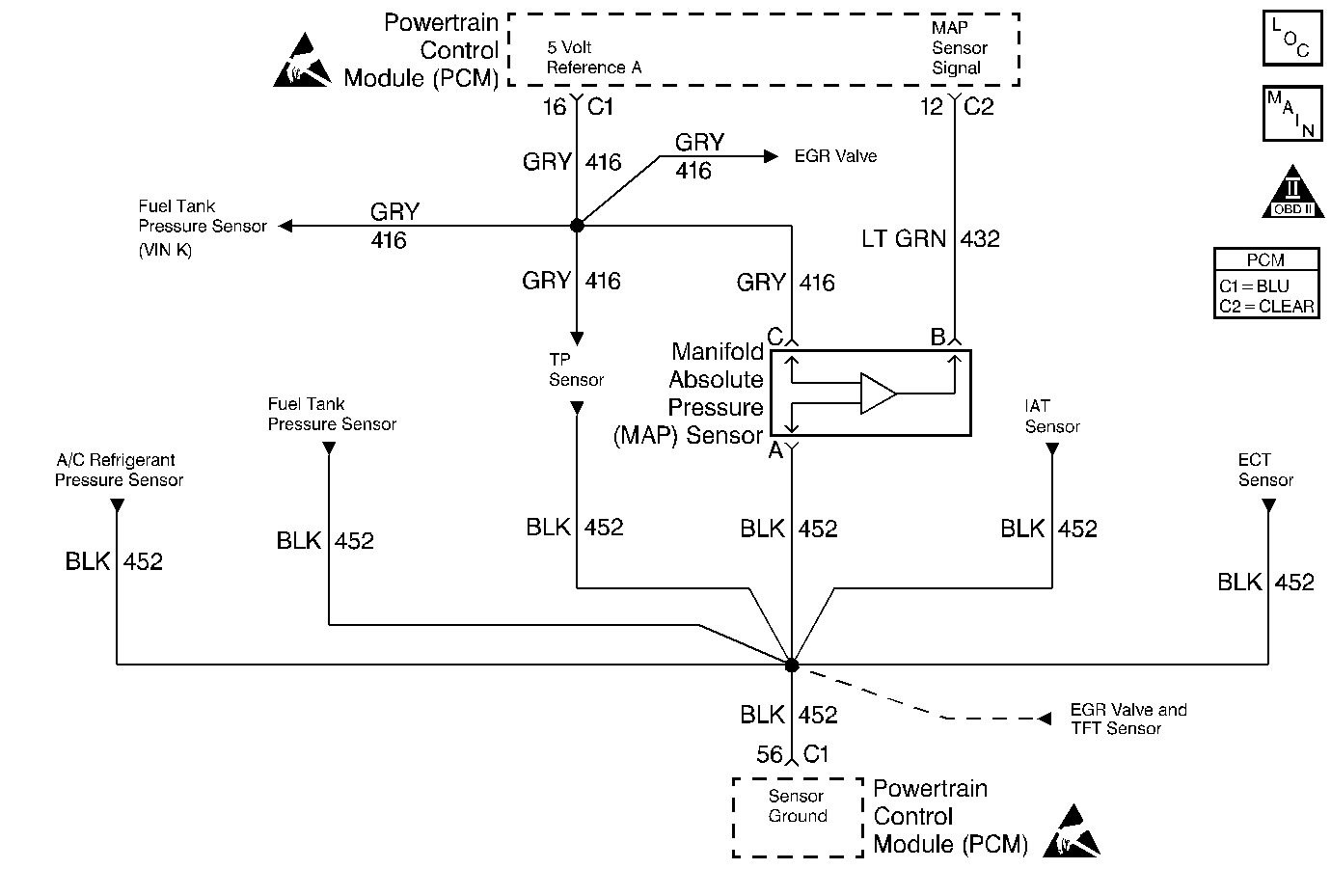
Circuit Description
The Manifold Absolute Pressure (MAP) sensor responds to changes in intake manifold pressure (vacuum). The MAP sensor signal voltage to the PCM varies from below 2 volts at idle (high vacuum) to above 4 volts with the key ON, engine not running or at wide-open throttle (low vacuum). The MAP sensor is used to determine manifold pressure changes while the EGR flow test diagnostic is being run (refer to DTC P0401), to determine engine vacuum level for some other diagnostics and to determine barometric pressure (BARO). The PCM monitors the MAP signals for voltages outside the normal range of the MAP sensor. If the PCM detects a MAP signal voltage that is excessively low, DTC P0107 will be set.
Conditions for Setting the DTC
| • | No TP sensor DTCs present. |
| • | The engine is running. |
| • | Throttle angle above 0%, if engine speed is less than 1,000 RPM. |
| • | Throttle angle above 6%, if engine speed is greater than 1,000 RPM. |
| • | The MAP sensor signal voltage is less than 0.1 volt. |
| • | Above conditions present for longer than 200 3X reference periods (67 crankshaft revolutions). |
Action Taken When the DTC Sets
| • | The PCM will illuminate the malfunction indicator lamp (MIL) during the second consecutive trip in which the diagnostic test has been run and failed. |
| • | The PCM will store conditions which were present when the DTC set as Freeze Frame and Failure Records data. |
Conditions for Clearing the MIL/DTC
| • | The PCM will turn OFF the MIL during the third consecutive trip in which the diagnostic has been run and passed. |
| • | The History DTC will clear after 40 consecutive warm-up cycles have occurred without a malfunction. |
| • | The DTC can be cleared by using the scan tool. |
Diagnostic Aids
Check for the following conditions:
| • | Poor connection at the PCM--Inspect harness connectors for backed out terminals, improper mating, broken locks, improperly formed or damaged terminals, and poor terminal to wire connection. |
| • | Damaged harness--Inspect the wiring harness for damage. If the harness appears to be OK, observe the MAP display on the scan tool while moving connectors and wiring harnesses related to the sensor. A change in the display will indicate the location of the malfunction. |
If DTC P0107 cannot be duplicated, the information included in the Failure Records data can be useful in determining since the DTC was last set. If it is determined that the DTC occurs intermittently, performing the DTC P1107 Diagnostic Chart may isolate the cause of the malfunction.
Test Description
Number(s) below refer to the step number(s) on the Diagnostic Table:
Step | Action | Value(s) | Yes | No | ||||
|---|---|---|---|---|---|---|---|---|
1 | Was the Powertrain On-Board Diagnostic (OBD) System Check performed? | -- | ||||||
2 |
Is MAP value near the specified value? | 0V | ||||||
3 |
Does the scan tool indicate DTC P0107 failed? | -- | Refer to Diagnostic Aids | |||||
4 |
Is the MAP value greater than the specified value? | 4.6V | ||||||
5 |
Is the MAP value greater than the specified value? | 4.6V | ||||||
6 |
Was a problem found? | -- | ||||||
7 |
Was a problem found? | -- | ||||||
8 |
Was a problem found? | -- | ||||||
9 |
Was a problem found? | -- | ||||||
10 | Replace the MAP sensor.
Is action complete? | -- | -- | |||||
Replace the PCM. Important:: The replacement PCM must be programmed. Refer to Powertrain Control Module Replacement/Programming . Is action complete? | -- | -- | ||||||
12 |
Does the scan tool indicate DTC P0107 failed? | -- | System OK |
